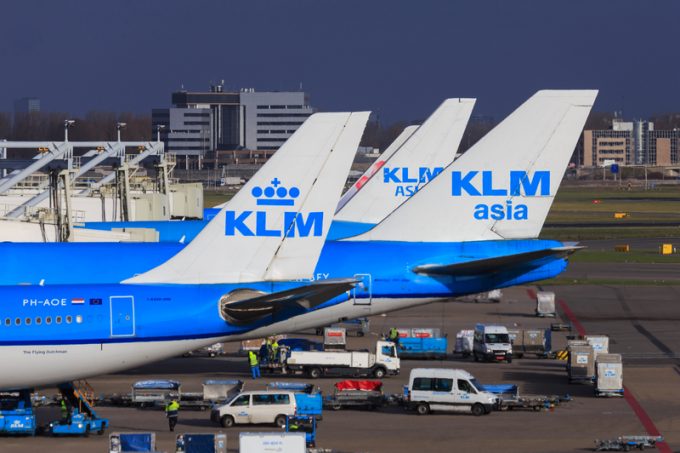News in Brief podcast | Week 30 2024 | Surcharges, strikes and IATA's stressful settlements
In this episode of The Loadstar’s News in Brief Podcast, host and news reporter Charlotte Goldstone ...
TFII: SOLID AS USUALMAERSK: WEAKENINGF: FALLING OFF A CLIFFAAPL: 'BOTTLENECK IN MAINLAND CHINA'AAPL: CHINA TRENDSDHL: GROWTH CAPEXR: ANOTHER SOLID DELIVERYMFT: HERE COMES THE FALLDSV: LOOK AT SCHENKER PERFORMANCEUPS: A WAVE OF DOWNGRADES DSV: BARGAIN BINKNX: EARNINGS OUTODFL: RISING AND FALLING AND THEN RISING
TFII: SOLID AS USUALMAERSK: WEAKENINGF: FALLING OFF A CLIFFAAPL: 'BOTTLENECK IN MAINLAND CHINA'AAPL: CHINA TRENDSDHL: GROWTH CAPEXR: ANOTHER SOLID DELIVERYMFT: HERE COMES THE FALLDSV: LOOK AT SCHENKER PERFORMANCEUPS: A WAVE OF DOWNGRADES DSV: BARGAIN BINKNX: EARNINGS OUTODFL: RISING AND FALLING AND THEN RISING

An aviation lawyer has branded Schiphol’s slot legislation “illegal” and “anti-competitive”, claiming the Dutch gateway is artificially restricting capacity.
Partner at Croon Callaghan Aviation Consulting LLP Jochem Croon told The Loadstar the current annual 500,000-flight movements cap stemmed from the Alders Agreement – which he claims lacks any legal basis – in 2008.
That agreement, said Mr Croon, was developed not by any legislative body or independent authority, but the aviation sector, Schiphol and its surrounding municipalities to achieve a 5% noise reduction by 2020.
He added: “A recent report on the environmental situation at Schiphol showed that already the aviation sector is extensively over-performing.
“By 2015, noise levels were down 29% on 2008 – because of improved aircraft efficiency and investments in new aircraft, with more sophisticated engine technology.
“Having already more than achieved the aim of Alders, regarding bringing down the noise, there should be room to add more slots without jeopardising the maximum permitted noise emissions in decibels (dB) as established by law (i.e. the Airport Traffic Ruling Schiphol). But instead, Dutch aviation is continuing to artificially pinch capacity by clinging to this extra judicial arranged movements cap.”
Mr Croon also rejected the persistent claims that the 29% reduction is inaccurate, noting legislation exists obliging an independent authority to evaluate and report on Schiphol’s environmental situation every two years.
However, he noted, the situation remained “politically sensitive”, adding that following the disclosure by Schiphol of its draft report, the airport was indeed asked to reassess these numbers.
Mr Croon went one further, stating that the 500,000-flight cap contravenes EU noise regulations, as the body involved in setting operating restrictions must be “independent”.
He said the Dutch coordination committee – which, pursuant to EU slot-regulation, should have an advisory role to government and the slot coordinator on how to efficiently use the spare capacity – was not functioning properly as required by EU law. This was due to Dutch national regulation.
“According to Dutch law, the aviation sector itself (ie, the Schiphol carriers, ATC and the airport operator) decides on the available capacity. These private forces (with the exception of ATC) formed the ‘Operational Schiphol Overleg’ (OSO), in effect usurping the coordination committee’s advisory role, and it now produces ‘capacity declarations’ each season,” added Mr Croon.
“So what you have is the same parties comprising the EU-mandated coordination committee also having decisive influence in establishing coordination parameters.
“Under this system, EU-required separation between the coordination committee’s advisory role and subsequent decision-making by an independent objective analyses has been discarded.”
As a result, Mr Croon said, there had been “myriad” harmful effects, with the OSO in effect “usurping” any independence and gaining “sole control” of the sector.
This had led to private sector parties with a dominant position, with their own commercial interests in mind, establishing the available capacity.
“Furthermore, the capacity declaration even exceeds its already excessive scope as permitted by Dutch law,” Mr Croon said. “While the instrument had only been conceived as a means to determine the coordination parameters, it goes much further.”
Mr Croon believes the determination of capacity is now subject to a struggle between market forces, adding that it was revealing when KLM challenged Schiphol about summer 2017 capacity.
“Putting market forces in the driving seat on allocating scarce capacity is totally contrary to EU laws and has all the hallmarks of cartel behaviour,” he continued.
“KLM and its partners operate some 70% of Schiphol’s flights and maintaining the current slot cap stymies any competition.”
He said this had led to significant concern that certain market players, driven by their own commercial needs, would determine capacity for slots allocation and even determine the way in which the slots were allocated.
To prevent this undue market influence on the determination and allocation of slots, Mr Croon has called for the decision-making to be helmed by an independent, impartial body.
In the absence of any legal amendments being made, Mr Croon said the wider industry needed to be more vocal in challenging the present system.
While AirBridgeCargo used Russia’s geographical location as ammunition against Schiphol, and played “hardball” to force KLM to make concessions, it is doubtful that another lone carrier would have the same might.
“But,” said Mr Croon, “without carriers willing to take up the gauntlet, the problem will remain until 2020, with the airport being closed to any additional growth.
“This needs to be challenged before then, in the interests of consumers and fair competition and to ensure further growth of air transport in the Netherlands.
“The slot allocations were implemented in order to prevent exactly this kind of situation, whereby industry players are able to limit the available capacity in order to prevent competition in their home market.”
Comment on this article